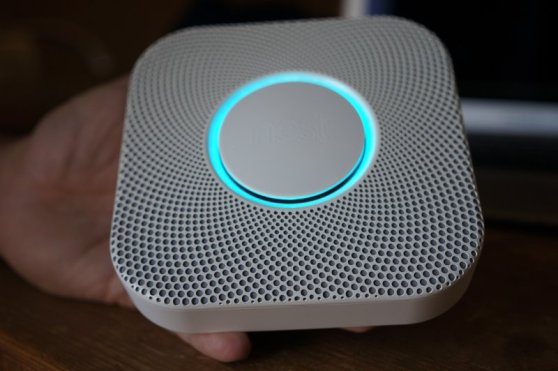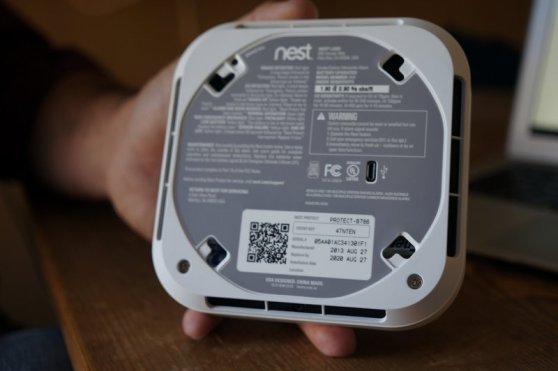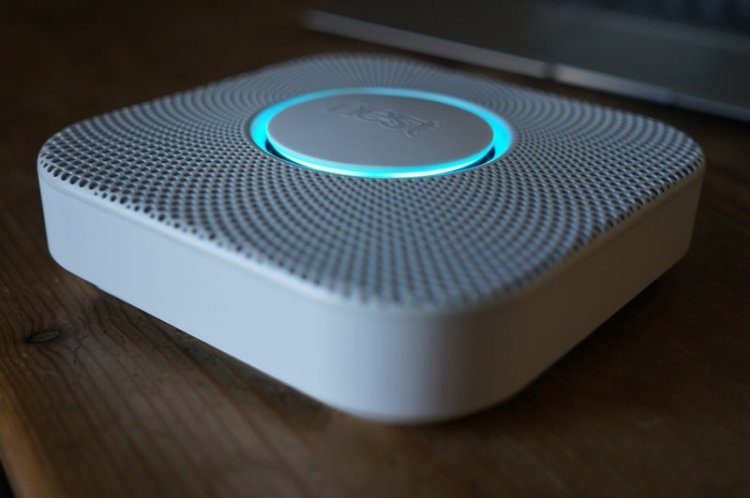“It’s 4 a.m. and what the hell is that beeping?!”
If you haven’t been rudely awaken by your smoke alarm’s dying battery cries yet, just give it time. For such essential and potentially life-saving appliances, smoke alarms sure can be annoying.
Now Nest, the company that unveiled an iPod-esque smart thermostat two years ago, has a solution: Nest Protect ($129), its attempt to modernize the typically annoying smoke and carbon monoxide alarm with a slew of features and mobile app connectivity. Best of all? It’s available to renters and home owners alike, unlike the company’s smart thermostat.
Think of an annoying aspect of your smoke alarm and Nest has likely solved it with Nest Protect. Instead of harsh beeps, it actually speaks to you so you know what’s happening (it will let you know when smoke is detected, or carbon monoxide is detected). Cooking something smokey that triggers the alarm? You can just wave your hand under Nest Protect to make it stop freaking out. Wondering if your Nest is working before you head to bed? Just look for the green status indicator when you turn off the lights. (Heck, Nest Protect is even helpful at night by serving as a nightlight when you walk underneath it.)
Through Nest’s mobile app (which also controls its smart thermostat), you can get alerts when the alarm is low on battery, or when it’s triggered when you’re away. You can also have multiple Nest Protect units in your home work together: For example, your bedroom Protect can tell you when your kitchen unit detects smoke.

Just like with its smart thermostat, Nest has taken a mostly ignored device and applied modern design, wireless features, and consumer friendliness to turn it into something you could actually adore. Its innovations could also potentially save lives: Vocal warnings clearly differentiate the type of emergency you’re facing, and since it’s so connected, you’ll never feel the need to yank out its battery to stop inexplicable chirping.
“We reinvent essential things, not superfluous things … Things that are important to have in your home,” said Maxime Veron, Nest’s director of product marketing, in a recent interview with VentureBeat. “We’re in the mindset of looking at unloved products … We have a list of products that aren’t right and we want to change,” he added.
Under all of its modern technology, Nest also made sure the Protect is a high-quality smoke and carbon monoxide alarm. Veron tells me the company is using the best carbon monoxide sensor you can buy today, and it also developed its own photoelectric smoke sensor.
Nest Protect is powered by two processors, one of which is dedicated to the safety features, while the other handles the more complex stuff, like voice alerts and recognizing your waving gesture to hush it. While it typically gets connected with your Wi-Fi network, multiple Nest Protect units also form a mesh network to stay connected if your Wi-Fi goes down.
For households that also have a Nest smart thermostat, Protect gains some extra features, like telling the thermostat to shut off your gas furnace if it detects a carbon monoxide. Nest Protect also makes the auto-away functionality from the Nest thermostat better, since it can detect when you’re in rooms the thermostat can’t see.

Above: Nest Protect’s rear panel
While Veron wouldn’t spill the details on what Nest is aiming to fix next, my bet is that we’ll see Nest dive into the connected lightbulb space at some point. I can just imagine controlling the lighting in different rooms from within the Nest app, and while there are plenty of companies exploring the connected lightbulb space right now, there’s still no clear winner. While it’s taking its time, Nest is slowly building a platform that can connect your entire home. (To that effect, the company just launched a public API for its thermostat.)
Nest Protect will be available in the U.S. in November for $129 in both wired and battery-powered models. It’s also going to be the first Nest product officially available in the U.K.
San Francisco-based Nest has raised around $80 million from Google Ventures, Kleiner Perkins Caufield & Byers, Shasta Ventures, and others.


